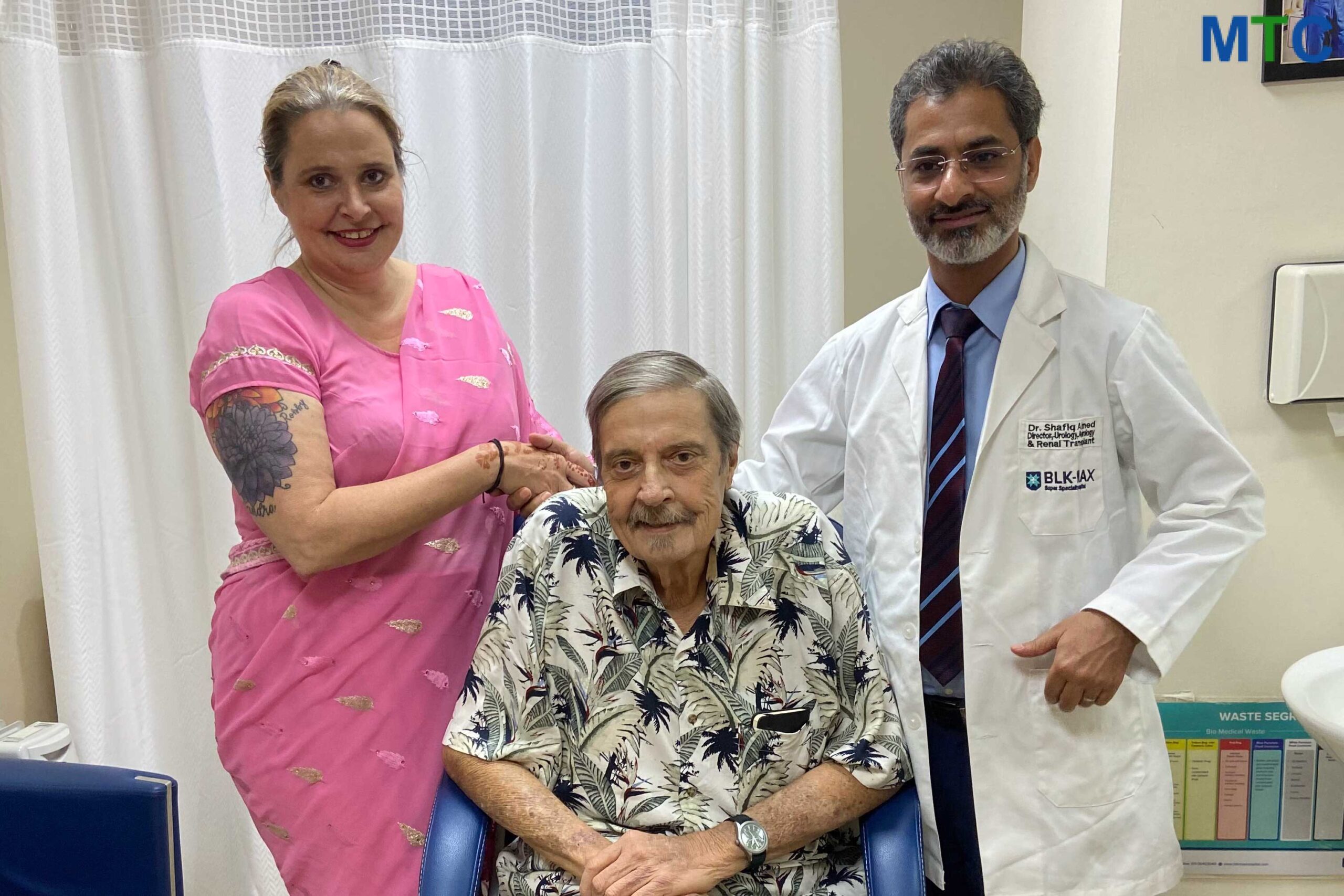Medically Reviewed By: Dr. David Warmflash (MD), Dr. Shelley Janssen (MD)
Kidney Transplant in India: Cost, Hospital, Success Rate & Donor Details
Here is our easy guide to kidney transplant in India. Know the cost, success rate, procedure, and donor information for international patients.
Contact us to find the right kidney transplant program for you.
Kidney Transplant in India: Americans Share Their Life-Saving Story!
Cost of Kidney Transplant in India
The cost of a kidney transplant in India ranges from USD $13,000 to $24,000.
If the donor's blood group is compatible with the patient's, the cost of treatment is $13,000. However, if the donor and patient blood types do not match, the cost increases to $24,000 because of the extra tests required.
Read more in the Procedure section.
In India, kidney transplant is legal only if the international patient gets their own donors from their families.
Read Kidney Transplant Abroad to know the complete process for renal transplant in India and other countries
The cost of kidney transplant in the US is over USD $400,000[1]
| Treatment | Cost in India | Cost in the US |
| Kidney Transplant | $13000 - $24000 | $442,500 |
*Cost can be subject to cases
According to Statista, over USD $150,000 goes into just surgery and hospitalization in the US.[2]
Procuring Kidneys from a donor registry is also an added cost.
Patients who have a relative acting as a donor may not incur this cost.
Here is a snapshot of the cost breakup:
| Parts of treatment | Cost in USD |
| Hospital transplant surgery | $152,300 |
| Procurement | $113,900 |
| Post-transplant follow-up tests | $85,500 |
| Pre-transplant tests | $32,700 |
| Medication | $31,900 |
| Physician | $26,200 |
| Total | $442,500 |
Package Cost and Timelines
Find out what is included and excluded in our package, ranging from USD $13000 to $24000.
| Person | Number of Days | Includes | Excludes |
| Patient | 8 |
|
|
| Donor | 3 |
Timeline for Renal Transplant in India
It takes 6-8 weeks for international patients to get a new kidney through a transplant.
Here is the treatment timeline with cost inclusions and exclusions.
| Phase | Treatment | Patient Duration | Donor Duration | Cost included or excluded |
| Total Stay | End-to-End | 8 Weeks | 6 Weeks | |
| Initial Part |
|
3- 4 Weeks | 3-4 Weeks | Excluded |
| Main treatment |
|
8 Days | 3 Days | Included |
| Last Part |
|
4 Weeks | 2 Weeks | Excluded |
*Duration is subject to change depending on the patient or donor health
Here is how foreigners can get into a kidney transplant program in India.
Procedure for International Patients to get Kidney Transplant in India

Did you know?
A large number of foreigners are resorting to India to get a renal transplant. The kidney transplant program in India is the second largest after the US.[3]
Once the international patient connects with our medical advisors, they are asked to share all the initial medical reports. Many times with renal failure comes several other complications, such as heart disease or anaemia.[4]
This is why our advisors require all records of the patient, to find them the best hospital in India for a kidney transplant.
Patients are connected to the hospital, where doctors assess the donor's eligibility.
Who can be a donor?
For foreigners in India, only 1st-degree relatives can be kidney donors. 2nd-degree relatives cannot donate their kidneys to overseas patients.
Here is the relationship degree chart for the type of donors:
| Donor Type in Relation | Relatives |
| 1st Degree Relative |
|
| 2nd Degree Relative |
|
| 3rd Degree Relative |
|
| 4th Degree Relative |
|
Know more about the law in India.
Legalities You Should Know!
In India, the Transplantation of Human Organs Act passed in 1994[5] has made rules stringent for international patients to get a kidney in India from a living or deceased source.
International patients need to get their own 1st-degree relative to be a donor.
Wondering what the legal process for kidney transplants in Turkey is? Check out our complete guide Kidney Transplant in Turkey.
Before Procedure: Tests to Identify Donor Compatibility
There are multiple tests required to prepare for a kidney transplant.
Here are the tests which determine whether the donor is compatible or not.
Each person has a different blood group. Some blood types are compatible only with specific other types.[6]
| Donors blood type | Recipient blood type |
| O | O, A, B or AB |
| A | A or AB |
| B | B or AB |
| AB | AB |
Previously, incompatible blood tests often led to donor rejection and transplant failure.
Now, India's leading hospitals use advanced treatments such as immunosuppressant therapy that allow transplants between incompatible kidney transplants.
These treatments are expensive and increase the overall cost of incompatible kidney transplants.
The doctor mixes the blood of the donor and recipient, assessing it for antibody reactions. If the recipient's antibodies attack the donor's, the kidney is incompatible and will likely be rejected by the recipient.
Tissue Typing is also called the HLA test. Each individual has a different HLA gene, except for twins. Doctors conduct this test on the donor and recipient.
The closer the match between the donor and recipient genes, the better the chances of the kidney successfully being accepted by the recipient.
Main Procedure: How Is the Surgery Performed?
Kidney transplant surgery can be done in different ways:
- Open Surgery: The traditional method of surgery in which an incision is made to fully reveal the organs involved.
- Laparoscopic Surgery: The surgeon makes small incisions and inserts a laparoscope (camera) and special instruments to perform the surgery.
- Robotic-Assisted Laparoscopy: The surgeon performs laparoscopic surgery on the patient remotely assisted by a robot.
90% of kidney transplant operations are done through Laparoscopic surgery. In younger & healthier patients, doctors often utilize robotic-assisted laparoscopy.
The Transplant Team
Kidney Transplantation requires a multidisciplinary approach with a number of specialists involved.
The treatment requires:
- Transplant Surgeon: Performs the surgery.
- Nephrologist: Specializes in kidney transplant and manages the entire process.
- Cardiologist: Monitors the heart before, during, and after the surgery.
- Anesthesiologist: Administers anesthesia and observes the patient’s level of sedation and vital signs throughout the surgery.
- Support staff.
The treatment involves other specialists if needed.
After Procedure: Follow-up and Diet
The patient requires close follow-up after surgery due to taking strong immunosuppressants, which weaken the immune system.
It is vital for the patient to rest, take prescribed medications, and maintain a nutritious diet for recovery.
What should the patient eat post-Kidney transplant surgery?
For those with weakened immune systems, a low-sodium, vitamin-rich, high-fiber, and lean protein diet is crucial.[7]
Patients should minimize sugar, salt intake, and fatty foods in order to maintain ideal weight and prevent cardiac or blood pressure issues.
Success Story of International Patient
Watch Earl Sorrells, an MTC patient from the US who came to India for a kidney transplant, tell his story when all hope was lost in his home country.
Thanks to the smooth facilitation by the advisors and the treatment plan designed by the doctors in India, Mr Sorrells' surgery was completed ahead of schedule. He left the country happy and healthy.
What Is the Success Rate of Kidney Transplant in India
Success Rate of kidney transplant in India is 98.7%.[8] In a study from the Southern part of India, published in the Journal of Association of Physicians in India, it was seen that patient survival was 98.7% at 3 years.
Best Hospitals for Kidney Transplant Program in India
Best Hospital in New Delhi

The JCI-accredited facility is one of the largest private clinics in Delhi and ranks among the top 10 multi-specialty hospitals.
As part of the Max Healthcare Group, a leading provider in India, it caters to both domestic and international patients.
The hospital specializes in cancer treatment, bariatric surgery, and cardiology, using advanced equipment that meets European hospital standards.
- 60+ Years of Experience
- JCI Accredited
- NABH Accredited
- Best transplant surgeon with over 18 years of experience in neurology, transplant and robotic surgery.
- One of the best success rates in Kidney Transplant in the world.
- Highly equipped with Laparoscopic and Robotic Surgery for transplant.
- Advanced technology such as Lamellar Airflow in the ICU help to minimise post-operative infections.
- Performed successful kidney transplants in HIV Positive patients
- Performed Successful ABO incompatibility kidney transplants
Best Surgeon for Kidney Transplant in India

Dr. Shafiq Ahmed
Dr. Shafiq Ahmed serves as the Director of Urology, Andrology & Renal Transplant at BLK-Max Super Speciality Hospital in New Delhi.
He has helped establish renal transplant programs, including robotic kidney transplants, in top hospitals in Delhi-NCR.
He is a US-credentialed robotic uro-oncologist and one of the few surgeons globally performing robotic kidney transplants.
Educación
CMC Medical College & Hospital, Ludhiana, India.
Membresías
- Urological Society of India
- Uro-oncology Society of India
- Kidney Transplant Society of India
Overview: Kidney Failure and the Need for Transplant
Kidneys filter waste and help to regulate blood pressure in the human body. They also help to produce vitamin D and a hormone that stimulates the production of red blood cells.
Diseases like diabetes, obesity, or heart conditions can lead to kidney failure. When kidneys fail, they cannot properly remove waste, leading to serious health issues or even death.
Treating Kidney Failure: Dialysis and Transplant
When kidney function declines to about 80-90%, symptoms like swelling of the feet and ankles, loss of appetite, vomiting, and fatigue emerge, signaling the need for immediate treatment.[9]
Toxic substances accumulate in the blood, and problems develop with electrolyte balance and acid-base balance. This means that immediate treatment is needed.
Dr. David Warmflash
Dialysis, which mimics kidney function, is the initial treatment doctors recommend and can sustain patients for a long time.
Kidney transplant is ultimately the treatment of choice for chronic renal failure rather than a lifetime on dialysis. Kidney transplants help those with renal failure feel better and live longer.
A 2021 study by NCBI found that dialysis in the US costs over USD$98,000 per person.[10] Considering the expense, discomfort and potential complications of long-term dialysis, doctors often recommend kidney transplant as the ideal treatment for kidney failure.
.
Type of Kidney Transplant Donors
Kidneys can come from 2 types of donors:
Deceased donor: A deceased donor is a person who has suffered brain death or cardiac arrest and is being maintained on life-support until their organ(s) are removed for donation.
Living donor: A living donor is a generally healthy person who consents to donating an organ. This is usually a relative.
What Are Risks Associated With Kidney Transplant
Be aware of the risks associated with Kidney Transplant:
- Infections: To prevent kidney rejection, recipients take immunosuppressants that weaken the body and increase the risk of infections.[11]
- Acute allograft dysfunction: Often due to blood clots, urinary leak, or obstruction of urine.
- Cardiac issues: Risk of heart attack due to blockage of blood flow to the heart tissue.
- Delayed graft function: A new kidney may take time to function properly, especially from deceased donors.
Kidney transplant recipients are routinely given antibiotics and antiviral medications to prevent infections, typically for the first six months to one year after transplantation.
Dr. Shelly Janssen
Is Kidney Transplant in India Safe?
Yes, Kidney Transplants can be safe in India, as per studies, with proper preparation, recipient screening before surgery, and multi-disciplinary inputs.[12]
Conclusion
Get a cost-friendly kidney transplant in India today.
Say goodbye to kidney problems! Discover success rate, procedure, and donor details.
We connect you to the best hospital and certified surgeons. Act now for a healthier tomorrow!
FAQ
Yes, US citizens can get a Kidney transplant in India. Reach our medical advisors for all information through the Contact Us button on the page.
Visit New Delhi, the capital of India, to find the best hospital, BLK Max Super Speciality, for a Kidney Transplant Program.
Reference
- National Library of Medicine: Global Perspective on Kidney Transplantation: United States
- Statista: Average amount charged for a kidney transplant in the U.S. as of 2020, by category
- Indian Journal of Urology: Current trends in kidney transplantation in India
- American Kidney Fund: Health problems caused by kidney disease
- Indian Journal of Transplantation: Legal Aspects of Transplantation in India
- National Kidney Registry: What Tests Do Kidney Donors Have to Take Before Transplant?
- National Kidney Foundation: Diet and Transplantation
- Journal of the Association of the Physicians in India: Demographic Characteristics, Outcome and Complications of Renal Transplantations at a Tertiary Care Center in South India
- National Kidney Foundation: Choosing A Treatment For Kidney Failure
- National Library of Medicine: Dialysis and Total Health Care Costs in the United States and Worldwide: The Financial Impact of a Single-Payer Dominant System in the US
- NHS Blood and Transplant: Early risks of a kidney transplant
- Transplantation: Is it Safe to Be Transplanted From Living Donors Who Recovered From COVID-19? Experience of 31 Kidney Transplants in a Multicenter Cohort Study From India





